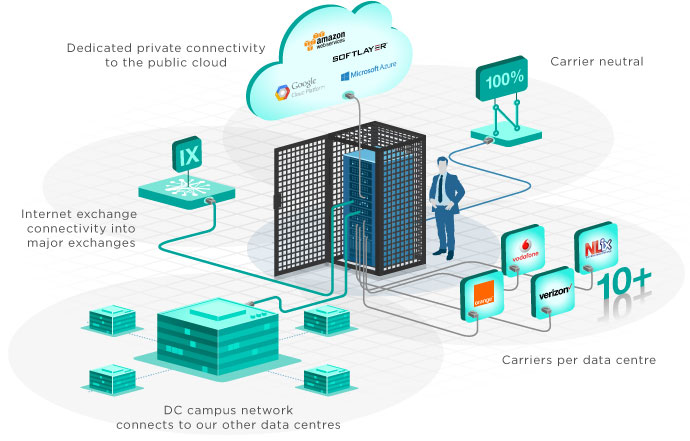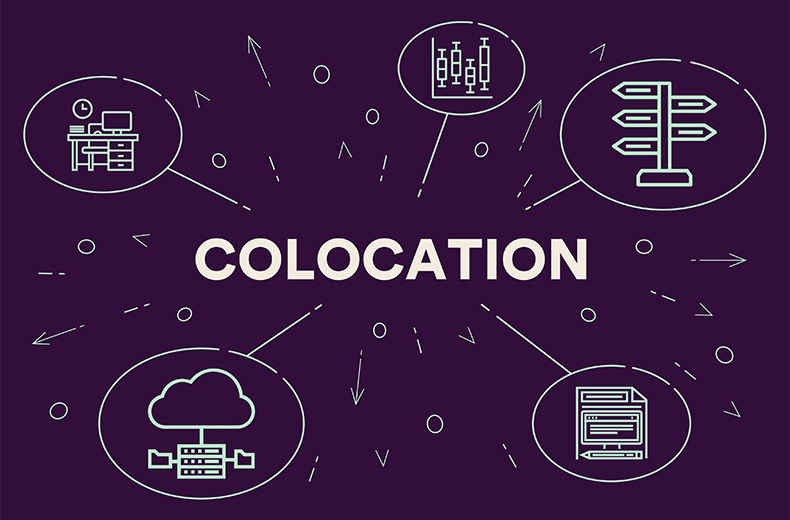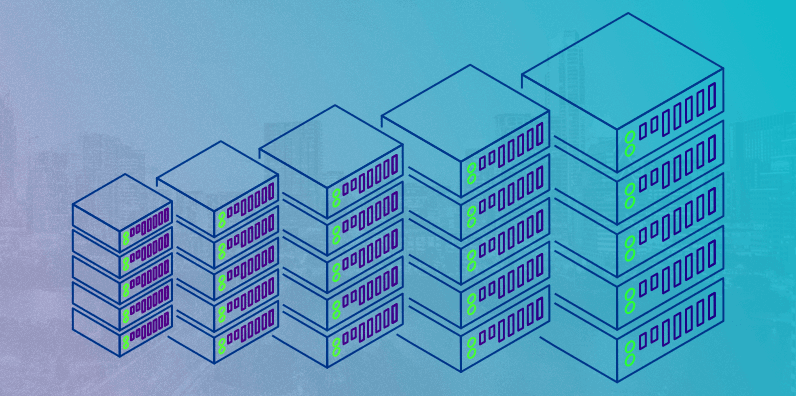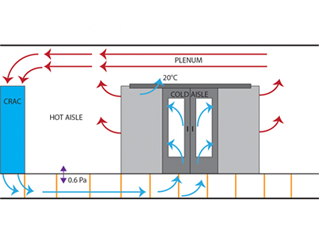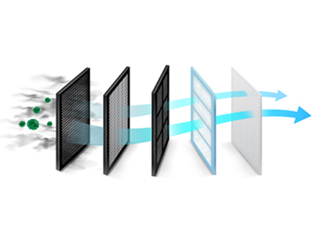
Photo Credit: www.coltdatacentres.net
What is Data Center Collocation?
A data center collocation is a third-party facility that hosts a business’ computing hardware and servers. These facilities are equipped with high intelligent data center monitoring systems for power, cooling, and security to protect businesses’ data. They also feature cabinets, cages, or even private suites. Collocation providers lease space to tenants. These tenants can interconnect with each other within the collocation data center. This enables them to do business together and centralize IT operations. Additionally, it paves the way for a more efficient architecture that can help reduce overall costs.
The move, expansion, and consolidation of data centers should be determined based on cost, operational reliability, and security. Due to this, many companies opt for collocation data centers. This is because it offers their needed solution without the inconvenience of managing their own in-house data centers.
The engagement of the enterprise customer with the collocation company is similar to a rental relationship with a property manager. The customer rents a specific location in the facility in order to store their equipment.
The customer usually provides the servers and other necessary hardware to be used for their company’s daily operations. The collocation data center stores the equipment in an ideal environment for servers. They ensure that they are kept in a cool and monitored environment. These are made complete with the necessary bandwidth requirement. These data centers have different tiers of service that can supply a specific uptime based on company needs.
Features of Data Center Colocations
Collocation centers are shared facilities. This allows companies to share costs, including power, cooling, communication, and data center floor space, with other collocation tenants. This method is relatively cheaper than creating a new data center. In the event that a company’s existing data center no longer suffices, businesses can enhance their current data center by using a collocation facility space.
Collocation data centers also allow companies to maintain their own equipment, similar to how they would maintain their own in-house data centers. It is particularly beneficial for businesses that need to have full control over their equipment. Additionally, it gives companies access to higher levels of bandwidth as opposed to bandwidth in a typical office server room.
Often, collocation data centers are more reliable since they offer better protection from power outages. This is because there are numerous data backups in place. They also have stringent measures for protecting and securing data. These facilities often have CCTV monitors, mantraps, private suites, fire detection, and suppression systems.

Photo Credit: imaginenext.ingrammicro.com
Enterprise Benefits of Data Center Colocation
Uptime
Many businesses are interested in data center collocation due to the server uptime it provides. A specific tier provides a certain percentage.
- Tier 1 Data Centers have a 99.671% uptime percentage yearly. Maximum total downtime per year = 1729.2 minutes or 28.817 hours each year
- Tier 2 DCs have a 99.741% uptime percentage yearly. Maximum total downtime per year = 1361.3 minutes or 22.688 hours
- Tier 3 DCs have a 99.982% uptime percentage yearly. Maximum total downtime per year = 94.6 minutes or 1.5768 hours
- Tier 4 DCs have a 99.995% uptime percentage yearly. Maximum total downtime per year = 26.3 minutes or 0.4 hours
Risk Management
Data centers are used as a data recovery strategy. This is to mitigate possible risk in the event of an external factor such as a natural disaster or outage occurs. A collocation facility allows a business to continue should a major disaster happen. If the location of a business loses power, its network will not be affected due to the data collocation.
The multiple layers of redundancy available at data center collocations are more complex than companies can afford to invest in-house. Due to this, some companies use the off-site location as their primary data storage, while the onsite data copies serve as a backup.
Security
The latest innovations in security technology are often embedded in data centers. They are often equipped with CCRV and biometric readers. Check-in desks are often in place in these data centers for inbound visitors. They ensure that these visitors possess the necessary security badges. There are 24/7 services for data center monitoring to ensure that there is no security breach or unauthorized access.
Cost
Collocation significantly reduces cost savings, especially when compared to in-house data centers. Leasing a place from a data center is a practical solution to minimal IT Budgets. Collocation reduces capital expenditures. Companies no longer need to procure their own UPS or uninterrupted power source, multiple backup generators, power grids, and HVAC units since they will be provided by the collocation data center. Businesses also no longer need to allocate maintenance costs for maintaining and managing in-house servers.
Bandwidth
Collocation data centers have high levels of bandwidth. These are normally not found in in-house data centers. These allow data center collocations to support enterprises in a way that their office location cannot.
Support and certifications
Payroll costs are also reduced by using data center collocations since they will be relying on the data center experts to manage the equipment. They will be able to gain support from certified experts to troubleshoot their concerns.
Scalability
Collocation data centers are conducive for supporting business expansion. These facilities are able to easily expand your IT infrastructure in proportion to the size of the business. Different industries have different requirements from their data centers related to space, support, power, and security. The service provider will be able to ascertain the business needs and make adjustments as necessary.

Photo Credit: www.datafoundry.com
Cloud and Data Center Collocation
Data storage and management is the main difference between collocation and the public cloud. Colocations offer physical management of assets while the cloud offers a virtual one. Cloud-based infrastructure also reduces costs because of shared facilities similar to collocation.
For cloud services, the provider is the one in charge of managing a company’s servers, storage, and network elements. The provider’s staff are also the ones who set up these elements. This reduces capital expenditure and lowers operating expenditure costs. Meanwhile, collocation requires businesses to employ their own staff to set up their own storage, servers, and network. However, such a setup will incur additional costs.
Many businesses prefer cloud services since they use data centers for more productive tasks for business expansion. Cloud services are also flexible. Cloud providers are able to rapidly adjust data capacity higher or lower based on evolving business needs. It also allows access controls to the environment, infrastructure resource management, and change management without being physically present.
However, experts believe that cloud services are more costly compared to data center collocation. Data center collocation is believed to be more cost-effective since businesses only need to rent the space for all assets. Meanwhile, renting the asset itself or the cloud storage will be limited based on the subscription.
Datacenter collocations tend to be used by cloud service providers. This is because they have huge equipment storage requirements. The industry, however, remains fluid to accommodate the changing of the laws with regard to cloud storage requirements.
Developments
Collocation has become a big industry over the last six years. There are large enterprises that are transitioning their on-premise data centers to collocation facilities. Many companies are also now considering multi-cloud services. Many organizations are also transferring into collocation data centers from their cloud deployments. This is because data volumes have started to become hard to manage and afford through the cloud. The re-nationalization trend that has been occurring worldwide has required deployments where customer data does not enter certain countries’ boundaries.
Digital Realty, the second-largest data center collocation provider by revenue, has developed engagement frameworks, discovery sessions, on-site workshops, and engineering briefings to allow customers to better understand how a global data center platform caters to their edge needs.
Monitoring
Monitoring is an often-neglected part of the overall collocation strategy. Basic data center monitoring takes very much effort to set up, and it can be a life-saver when the chips are down. Make sure that your chosen data center collocation provider has a
strong monitoring system to ensure efficiency in operation. You’ll need a system that gathers and analyses system logs from your devices to receive and forward the traffic of the servers. AKCP has a data center monitoring solution to gather logs from many different devices, store them in one place, and provide analysis tools. AKCP monitoring can be implemented at many levels. Here are some:
Surrounding Monitoring
A data center is not a simple public facility where anyone could be granted access. No matter if it is your own facilities or in a collocation, you should make sure to have the highest level of security. Unauthorized entry can be prevented with CCTV, surveillance guards, RFID security card-based access to internal facilities, and alarms. You can also have remote monitoring access to these various security means.
Environment Monitoring
A proper data center should be set up with different types of sensors to monitor the temperature, humidity, and water, power level. These monitoring systems are installed to keep track of every environmental variable within their data center. A monitoring system gives a precise notification which might be useful for the technical team to be aware of harmful issues. Thus, implement preventative measures necessary. Proper utilization of these environmental monitoring tools will allow the data center provider to see which system is using which resources, this is what helps them to maintain their optimal performance.
Conclusion
It is evident that the use of data center collocation provides several advantages to businesses. It also has a wide variety of customizable options that businesses can choose from depending on their industry needs. Collocation and cloud services offer different business alternatives in housing data. Each service has its own unique pros and cons.
There is an increase in the need for monitoring data centers’ collocation. New technologies are also becoming available that offer rack storage and density options. This allows monitoring data centers collocation to better manage the demand.
It is reported that data center collocation will undergo further rapid growth throughout 2021. Since there is an increased demand for these facilities, there will also be a need to tighten virtual and physical security. Ensuring that stringent security measures are in place will be vital as data centers continue to evolve with new technology. It is important to ascertain the collocation service that is most suitable for the company’s needs in order to identify the best course of action moving forward.
Reference Links:
https://www.coresite.com/solutions/colocation
https://www.datacenterknowledge.com/colocation/what-data-center-collocation-today-and-why-it-s-changed
https://www.bmc.com/blogs/data-center-colocation/
https://www.365datacenters.com/portfolio-items/colocation-compare-public-cloud/
